“He punched me, he kicked me, he elbowed me, he choked me unconscious, he smothered me with pillows, he pinned me down for hours at a time, he destroyed all my belongings, he pulled a knife on me and said he was going to kill me and the boys and then kill himself.”
Bec Rawlings, the self-styled “Queen of bare-knuckle boxing,” is remembering the terror of living with an abusive husband. Though the 29-year-old Australian doesn’t cry anymore when talking about her miserable marriage, some wounds will never heal.
Nearly six years on, she can sleep now without fear of being murdered and no longer flinches when touched. “It gets easier day by day,” she says candidly. “I’m alive, I survived.”
The former UFC fighter, a mother of two boys, a bare-knuckle world champion, is opening up because she wants to help those who may be suffering like she once did.
She wants to tell victims of abuse that they are not to blame, that they are not weak. “I’m the definition of a powerful woman,” she says. “That it can happen to me means it can happen to anyone.”

Rawlings did not press charges against her now ex-husband Dan Hyatt, the father of her youngest child. Since their relationship ended, former MMA fighter Hyatt has been found guilty of physically and emotionally abusing girlfriends in subsequent relationships and Rawlings regrets not taking her case through the courts.
“I could’ve saved them if I went ahead and pressed charges,” says the Tasmanian, ruefully.
“The only way I feel I can make up for that is to share my story and hope someone reads it and realizes that if it can happen to someone like me, who is so strong and looks fearless, it can happen to anyone. It doesn’t mean you’re weak, you’re not pathetic, because that’s how I felt.”
In the dead of night, with her two boys, Enson and Zake, and little else in tow, Rawlings mustered the courage to leave her husband and her home in 2013. Had it not been for her sons, she says, she would probably have stayed in a relationship which as emotionally abusive as it was physical.
“I left to save them,” she says. “Once he threatened to hurt them that was my switch to get out. If I never had them, I would never have made it out.”
Visit CNN.com/Sport for more news, features and videos
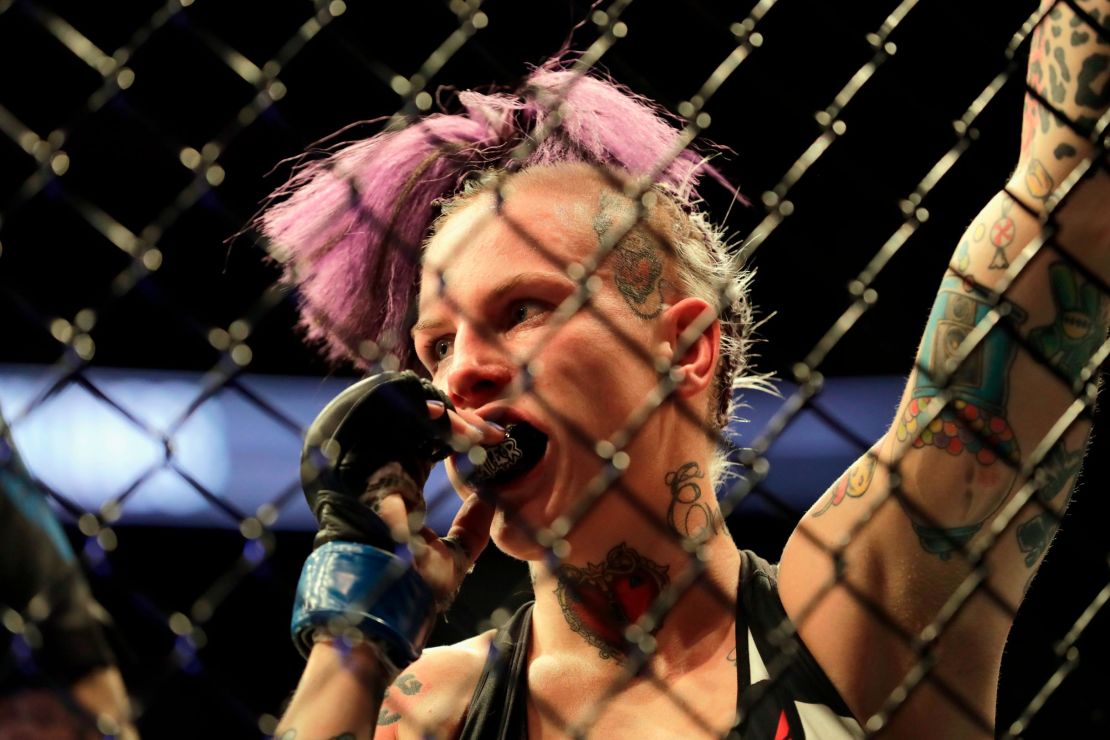
Rawlings met Hyatt in 2010 and within three months she says he began to belittle her, to play with her mind, the torment turning physical when Rawlings became pregnant with Enson. It was relentless. It was daily. It was hell. But crushed by his fists and by fear, she stayed.
“Looking back, I see the flags early on in our relationship,” the boxer admits with the help of hindsight.
“He was a pro fighter himself so even when I tried to fight back I couldn’t win. It was impossible for me to defend myself. He’d burn and tear my clothes. There were times that I had no clothes because he would destroy them.
“He always said he would hunt us down and hunt my family down if I ever left and that was always in the back of my head – that he would find us and would kill us.”
Hyatt was released from prison eight months ago and in an email to CNN the Australian described his relationship with Rawlings as “toxic” and “volatile” but refuted the allegations of violence made by her and described her claims that he threatened to kill the boys as “disgusting.”
“Bec is as much a victim of our relationship as I was myself,” he wrote. “That may not be a popular opinion, but its [sic] the truth and it’s been my story since day one. I was a poor partner and an even poorer father, but I am certainly not the picture Bec likes to paint of me when media comes calling.”

For Rawlings if any good has come from the bad it is that it was her ex-husband who introduced her to MMA, setting her on a path to UFC, bare-knuckle boxing and world domination. “I’m happy, strong and healthy,” she says. “I’ve got a good life and he hasn’t so that’s the ultimate revenge, success.
“It’s definitely a bitter-sweet story because I found fighting and MMA when I started seeing him, so he brought something cool into my world and, obviously, my young son Enson.
“It’s definitely made me the strong person I am today. I know going into training, going into fights, no-one can hurt me as much as he could. He’s definitely given me a strength I never knew I had. That’s one of the positives I can take. If he couldn’t break me, no-one can.
“It also taught me to love myself, to never let myself be in that position again. I put up with it and went through with it because I thought I deserved that and because I didn’t love myself and I believed what he was saying.”
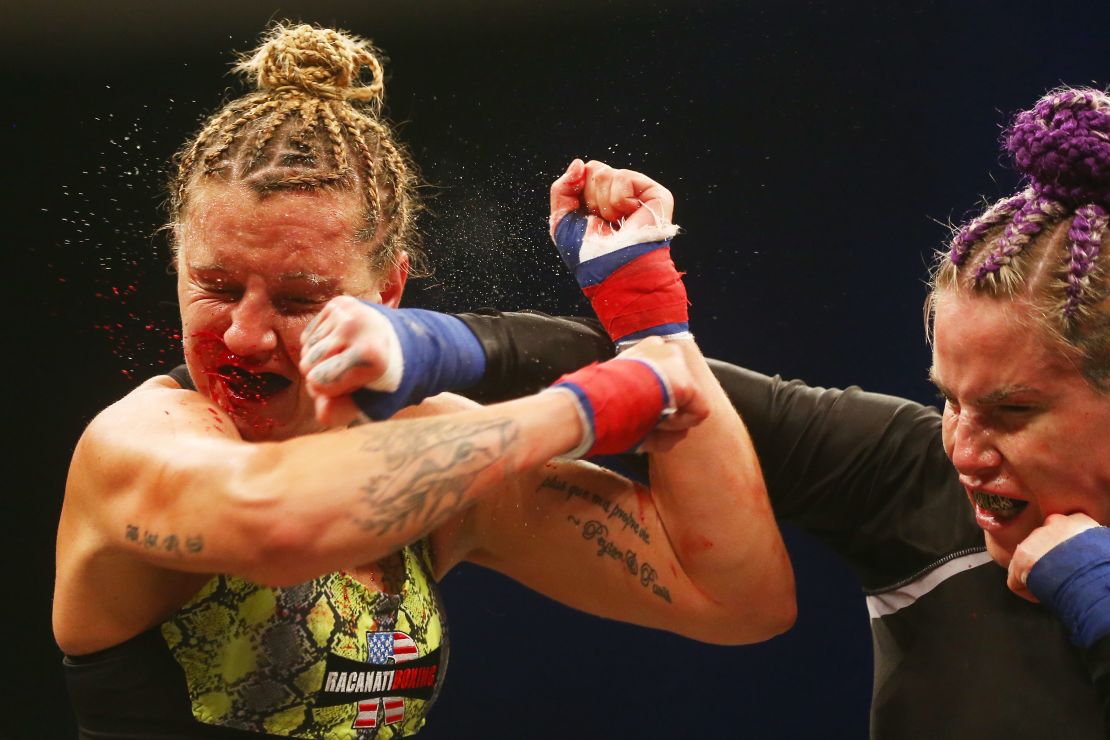
The Australian has come a long way since her professional debut as an MMA fighter in October 2011. Knocked out in the first round by a head kick, it was a fight which, Rawlings jokes, “scared my mother for life.” Her mum has not attended a fight since. These days she will record a televised bout, watching her daughter only when secure in the knowledge that she is unharmed.
Standing at 1.68m (5ft 6in) and competing at a fighting weight of 57kg (125lbs), the athletic Rawlings, who once described herself as a “wild child” and has the moniker “Rowdy Bec” stitched onto her fighting shorts, isn’t big in stature, but she does nevertheless stand out.
Sometimes her hair is purple, other times white and dreadlocked. There are also the tattoos. Lots of them. She has, she thinks, about 60, all inked by the tattooist who was her first sponsor.
One tattoo is a big red heart at the front of her throat, another the word “Riot,” her ex-husband’s nickname as an MMA fighter, still visible under a red “VOID” stamp. Her left leg is adorned with a tattoo of a hand pistol tucked into a garter.
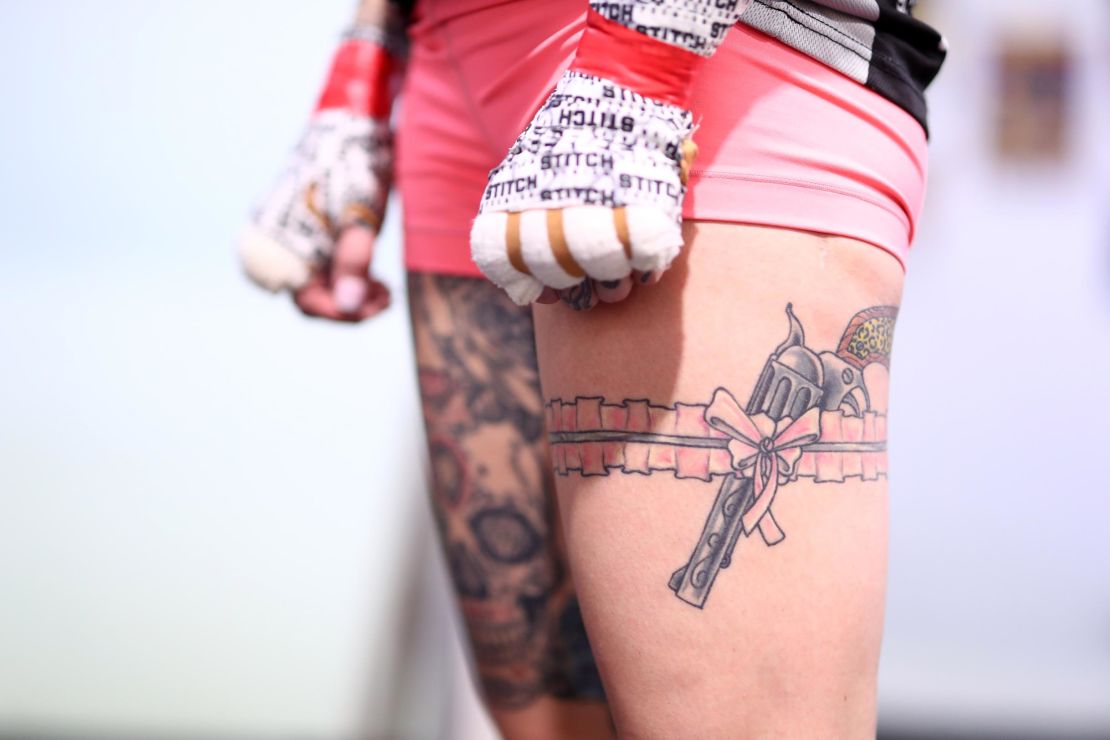
Like most who earn a living with their fists, Rawlings has swagger (“I definitely think I’m going to be dominating this sport for a long time”) but the bluster isn’t relentless.
She isn’t afraid to talk about her traumatic past and laughs when speaking about one particular weakness. A design on her right leg has yet to be completed because, she says giggling, she is a “cry baby” when it comes to getting inked.
But Rawlings can tolerate pain better than most, though the Australian stresses that the majority of her training sessions are spent mastering the art of avoiding crunching blows to the head by a clenched bare knuckle.
How does it feel to be bashed in the face by a fist flying at such a force that the eyes begin to weep and swell? Rawlings laughs.
“To be punched bare-knuckle, it doesn’t feel any different to the MMA gloves,” she explains.
“When you get punched by a big boxing glove it’s more like a thud that rings your head. With MMA gloves and bare-knuckle, it’s like a real sharp sting. If you’ve ever been hit on the nose with a basketball, it’s kind of that feeling. That stingy, eye-watering feeling.
“To hit someone bare-knuckle you feel it on your hands more. You can’t be throwing punches 100% and you definitely have to be careful with where you’re throwing the punches.
“You don’t want to be hitting people at the back of the head, or the side of the head, because you’re going to do damage to your hands, so you’re going to have to be precise and aim for the softer parts of the body and the face, look after your hands that way.
“You definitely throw a lot less punches and focus on speed, precision and power.”
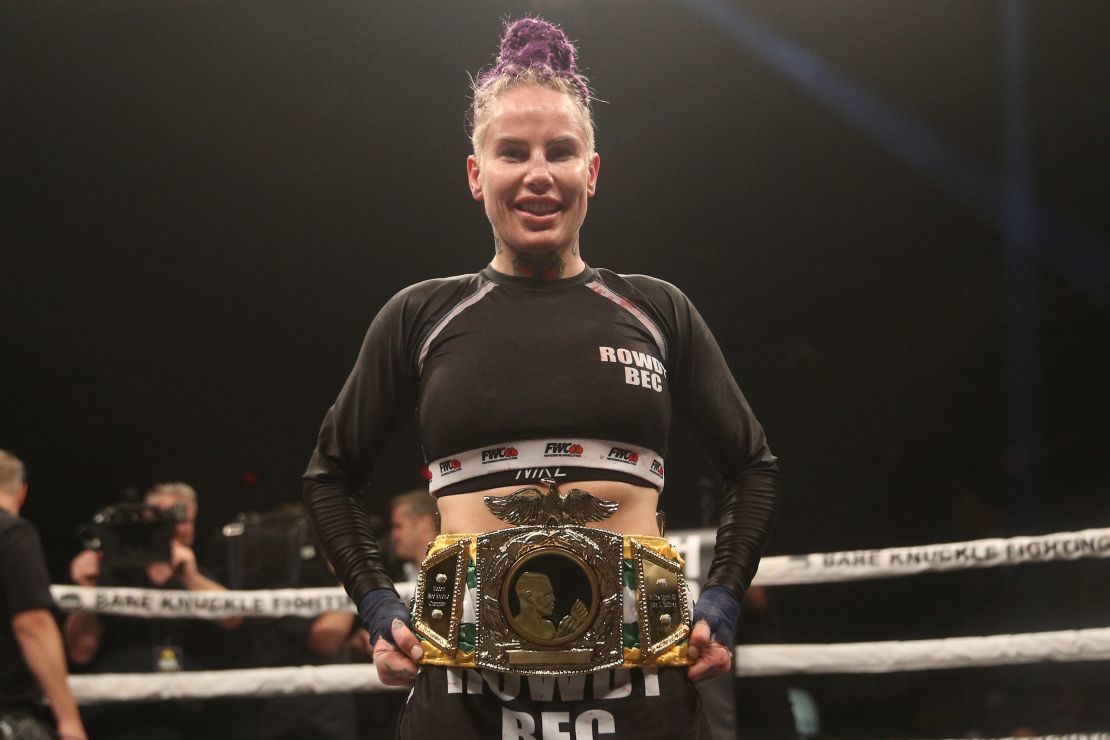
Rawlings says her hands swell easily, but with the added composure that comes with experience the bumps, cuts and redness were not as significant after her second bout compared to her debut.
To strengthen her hands, she practices an ancient Kung Fu method called iron palm training, which includes punching sandbags and rubbing a special oil onto the hands to help them heal.
“Basically, you’re calcifying your knuckles, so they get hardened and less prone to injury,” she says.
Rawlings is currently training for her world title defence on February 2 in Cancun, Mexico, against Cecilia Ulloa Flores. Though only her third bare-knuckle fight, she is confident.
“I get called the bare-knuckle queen and I feel like the queen of this sport,” she says.
“I don’t think anyone’s got what I have. My skill is getting better and better every fight and I’m going to go out there in February and show that I’ve evolved as a fighter again.”
Typically, Rawlings trains for three to four hours a day, starting with a 2-3km early morning run before returning home to feed her boys and take them school.
With the children in the classroom, she embarks on a two-hour boxing session in the gym, comprising of either sparring, bag work or pattern drills, returning home for lunch and to collect the boys from school. Mid-afternoon and there is more to be done, either improving her cardio, endurance or explosiveness.
Sometimes she will have to drag her sons, now aged eight and 10, to the gym. They have known of no other life, but occasionally they will grumble. With the boys developing their own interests, the family dynamic is slowly changing Rawlings admits, but she is adapting.
“You’ve got to be able to give your kids attention and love and you also need to find the time to train. That’s my job. It’s how I put food on the table,” she says.
“It’s stressful and hard, but it’s also my motivation. They keep me hungry, they keep me motivated to do better. It’s definitely a blessing in disguise.”
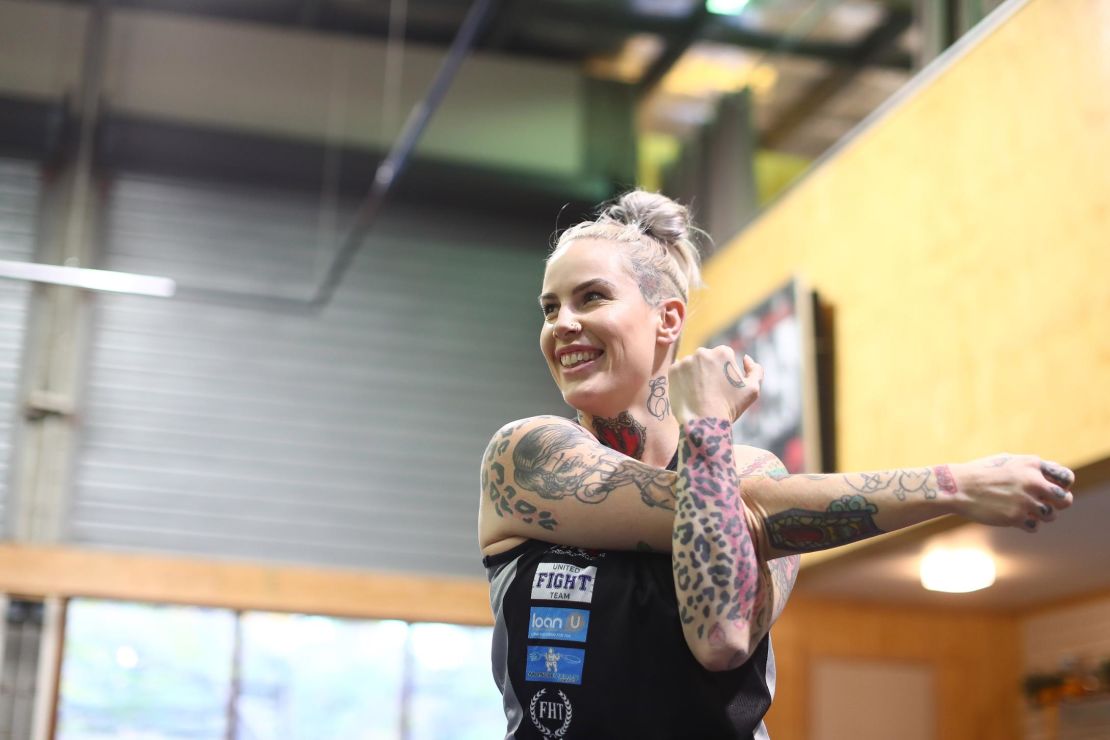
After being released by UFC following four successive defeats, Rawlings was offered a contract by the Bare Knuckle Fighting Championship (BKFC), the first promotion to be sanctioned to hold regulated bare-knuckle events in the US since 1889.
She is earning a decent living competing in a sport she describes as the “ultimate test on your body, heart and soul,” and wants to create a legacy. She has, she says, found her calling.
“I love the adrenaline of it. I love the rawness of the sport,” she says wholeheartedly.
“It’s not just the physicality, it’s not just the athleticism, it’s your mentality and your heart to fight and keep going.
“I’m forever tested no matter how my fight goes. I learn something new about myself and I think that’s what keeps me coming back for more and it’s the same with training.
“I think I lost the love of it [fighting] under UFC. I let the bright lights, the stress of making weight, get to me. I started questioning myself and forgot what I was doing it for. I forgot that I loved fighting, that it made me a better person, and I forgot that.
“My coach and anyone who has seen me fight say I’m a natural. I was made for this sport and I feel like that in training and when I fight.
“I feel like I’m meant to be in this sport and this was my calling.”



